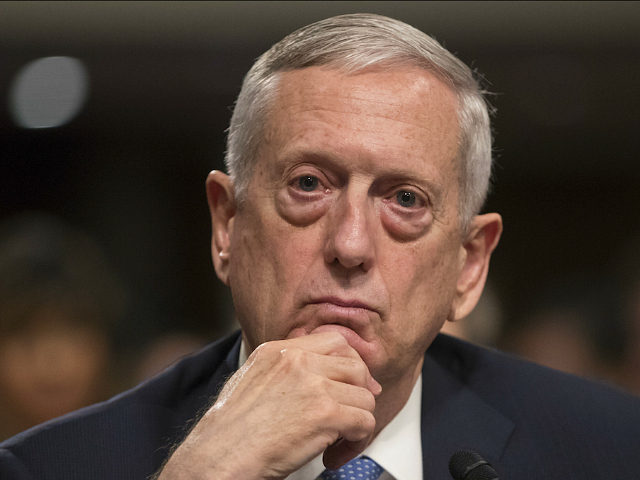The Chinese Foreign Ministry has expressed its “firm opposition” to “irresponsible remarks” by Secretary of Defense James Mattis, who demanded at a security conference in Singapore this weekend that China cease its mission to colonize the entire South China Sea.
Mattis called upon China to stop “militarizing artificial islands and enforcing excessive maritime claims.” China claims most of the South China Sea, disregarding the territorial sovereignty of Vietnam, the Philippines, Brunei, Malaysia, and Taiwan. The Chinese government has invested heavily in building artificial islands in the region in the past decade, equipping them with military surveillance units, surface-to-air missiles, and other weapons.
Chinese Foreign Ministry spokeswoman Hua Chunying published a response to Mattis’s statements on the Ministry’s website, which did not mention Mattis or the United States but made clear that America was its target.
“The Chinese side has noted their irresponsible remarks and hereby expresses strong dissatisfaction and firm opposition. I want to highlight a few points,” the statement begins, continuing:
First, China has indisputable sovereignty over the Nansha Islands and their adjacent waters. … China builds relevant facilities on islands and reefs of the Nansha Islands for the purpose of improving the working and living conditions for people stationed there, better defending its sovereignty and performing China’s international obligations and responsibilities.
“It is totally within China’s sovereignty to deploy necessary defense facilities on its own territory,” Hua continued. “It is exercising the self-preservation and self-defense rights that a sovereign state is entitled to, and has nothing to do with ‘militarization.'”
The statement goes on to claim that relations between China and the affected countries “has calmed down and turned positive,” and only “certain countries outside the region” object to China’s claims in the region. “The Chinese side is firmly opposed to that and urges relevant parties to stop their irresponsible remarks, fully respect regional countries’ efforts to maintain peace and stability in the South China Sea and play a constructive role to that end,” Hua demands.
The statement concludes mentioning the territorial dispute between China and Japan over the East China Sea’s Senkaku (Diaoyu) Islands and its refusal to acknowledge the sovereignty of the Republic of China (Taiwan).
The “Nansha” (Spratly) Islands inhabit a part of the South China Sea claimed by the Philippines and Vietnam. The Permanent Court of Arbitration at the Hague ruled last year that China has no legitimate territorial claims to them; China called Japan and the United States, who were not parties in the case, “eunuchs” and refused to abide by the decision.
The statement from Beijing follows remarks Mattis made in Singapore this weekend while attending the Shangri-La Dialogue, a regional security conference. “We oppose countries militarizing artificial islands and enforcing excessive maritime claims unsupported by international law. We cannot and will not accept unilateral coercive changes to the status quo,” Mattis told reporters. “We will ensure we have the military means to keep the peace. But we will not use our allies and partners or our relationships with them, or the capability integral to their security as bargaining chips.”
Following Mattis’s remarks, Secretary of State Rex Tillerson reaffirmed America’s commitment to limiting China’s encroachment into the sovereign territory of other countries in the region. “We oppose China’s artificial island construction and their militarisation that features in international waters,” Tillerson said during an Australia-U.S. security summit. “China is a significant economic and trading power, and we desire productive relationships, but we cannot allow China to use its economic power to buy its way out of other problems, whether it’s militarizing islands in the South China Sea or a failure to put appropriate pressure on North Korea.”

COMMENTS
Please let us know if you're having issues with commenting.